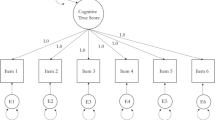Abstract
The budget-voting paradox states that, when social alternatives are proper subsets of a finite set of decisions, choosing decision-wise according to the majority rule may select an alternative that is covered in the majority tournament among alternatives. Individual preferences are defined on single decisions, and are extended to preferences over the alternative set by means of a preference extension rule. We prove the existence of the paradox for any rank-based, monotone, and independent extension rule.
Similar content being viewed by others
References
Anscombe G.E.M. (1976) On frustration of the majority by fulfillment of the majority’s will. Analysis 36: 161–168
Barbera, S., Bossert, W. and Pattanaik, P. (2001), Ranking Sets of Objects, Cahier 02-2001, C.R.D.E., University of Montréal
Bezembinder T., Van Acker P. (1985) The Ostrogorski paradox and its relation to nontransitive choice. Journal of Mathematical Sociology 11: 131–158
Brams S., Kilgour D., Zwicker W. (1998) The paradox of multiple elections. Social Choice and Welfare 15: 211–236
Deb R., Kelsey D. (1987) On constructing a generalized ostrogorski paradox: Necessary and sufficient conditions. Mathematical Social Sciences 14: 161–174
Kelly J. (1989) The Ostrogorski paradox. Social Choice and Welfare 6: 71–76
Kornhauser L.A., Sager L.G. (2004) Group choice in paradoxical cases. Philosophy and Public Affairs 32: 249–276
Laffond G., Lainé J. (2000a) Representation in majority tournaments. Mathematical Social Sciences 39: 35–55
Laffond G., Lainé J. (2000b) Majority voting on orders. Theory and Decision 49: 251–289
Laffond G., Lainé J. (2006) Single-switch preferences and the Ostrogorski paradox. Mathematical Social Sciences 52: 49–66
Laslier, J.F. (1997), Tournament Solutions and Majority voting, Spinger Verlag, Berlin, Heidelberg, New York.
List C. (2003) A possibility theorem on decisions over multiple interconnected propositions. Mathematical Social Sciences 45: 1–13
List C. (2006) Corrigendum to a possibility theorem on decisions over multiple interconnected propositions. Mathematical Social Sciences 45: 1–13
List C., Pettit P. (2004) Aggregating sets of judgments: Two impossibility results compared. Synthese 140: 207–235
Miller N. (1980) A new solution set for tournaments and majority voting: Further graph-theoretical approaches to the theory of voting. American Journal of Political Sciences 24: 68–96
Moulin H. (1986) Choosing from a tournament. Social Choice and Welfare 3: 271–291
Nurmi H. (1999) Voting Paradoxes and How to Deal with Them. Springer-Verlag, Berlin, Heidelberg, New York
Rae D., Daudt H. (1976) The Ostrogorski paradox: A peculiarity of compound majority decision. European Journal of Political Research 4: 391–398
Scarsini M. (1998) A strong paradox of multiple elections. Social Choice and Welfare 15: 237–238
Wagner C. (1983) Anscombe’s paradox and the rule of three-fourths. Theory and Decision 15: 303–308
Wagner C. (1984) Avoiding Anscombe’s paradox. Theory and Decision 16: 233–238
Author information
Authors and Affiliations
Corresponding author
Rights and permissions
About this article
Cite this article
Laffond, G., Lainé, J. The Budget-Voting Paradox. Theory Decis 64, 447–478 (2008). https://doi.org/10.1007/s11238-007-9047-1
Received:
Accepted:
Published:
Issue Date:
DOI: https://doi.org/10.1007/s11238-007-9047-1




